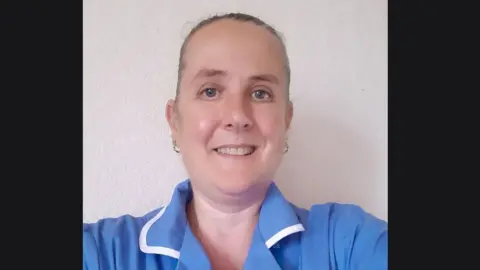Millions 'could miss out on new skills scheme'
 Getty Images
Getty ImagesMillions of low-paid workers risk missing out on a new government scheme aimed at improving skills and qualifications, a think tank says.
The Lifetime Skills Guarantee aims to offers courses for adults without any A-Levels or equivalent qualifications.
But the Work Foundation think tank discovered that 1.4 million low-paid workers aged 25-49 had at least one qualification that would rule them out.
Other workers might miss out because of financial pressures, it added.
The research cited the Office for National Statistics' Labour Force Survey.
Prime Minister Boris Johnson announced the new programme in September as part of a broader shake-up in adult education. The programme will offer fully funded college courses to all people over 18 in England without an A-level or equivalent qualification.
These equivalent qualifications include level 3 NVQs and music grades 6, 7 and 8.
Previously, only people aged under 23 qualified for a fully-funded qualification at this level.
"The Lifetime Skills Guarantee offers a real opportunity to boost life-long learning," said Ben Harrison, director at the Work Foundation, which did the research with job firm Totaljobs.
"But as things stand there is a real risk that millions of those who would most benefit from additional training won't access it - either because they are not eligible, or because the Covid-19 pandemic is exacerbating financial and family pressures."
The report suggests that the government should rethink who is eligible for the free training and to help with childcare.
A spokesperson for the Department for Education, said that as well as the Lifetime Skills Guarantee: "We have also launched The Skills Toolkit, which includes over 70 free to access courses from everyday maths, digital marketing to personal branding for career success and coding, which is available to anyone who is thinking of a career move.,"
"Through our £2.5bn National Skills Fund we will also make sure more adults can retrain and upskill so we can unlock even more potential and level up opportunities across the country."
Former lawyer Jake Levy became an analyst at an investment firm which focuses on socially responsible projects.
 Jake Levy
Jake Levy"At the moment, there's a lot of talk about people having multiple careers and mid-career shifts, but I don't think it's easy and I think for people who don't have the resources to retrain, there's a shortage of specialist on-the-job training," he said.
Mr Levy was able to switch careers with the help of a programme called On Purpose, which allowed him to "try before you buy" through two six-month work placements while being paid and trained.
"There are more programmes emerging but it could be a lot easier," he said. "I have a couple of young kids so the stakes are higher".
Employer training
Many people who do make the move to a new career are relying on employers or private programmes for retraining, or industries such as teaching which have established means of retraining entrants who have had other careers.
Julie Fitzpatrick decided to become a carer while on furlough, and received training from her employer Bluebird Care in Evesham in the West Midlands. Being trained on the job was a big advantage, she said.
She previously worked in the sales department of a manufacturing company.
 Julie Fitzpatrick
Julie FitzpatrickFor her, "it was a lot easier" than she thought.
Most of the barriers were "what-ifs", she said. "Especially with everything going on with the viruses, can they keep you, with all the redundancies? It was scary."
But Ms Fitzpatrick was inspired by local carers she saw enjoying their jobs and is glad she changed career.
Oliver Seadon made the move into teaching through the charity Now Teach after discussing it with friends and family members already working in the profession, and after losing his job in March.
He worked as a tour director for circus giant Cirque du Soleil but coronavirus meant its tour was cancelled.
Instead of working in Sao Paulo, he is now teaching in Wimbledon, South London.
 Oliver Seadon
Oliver SeadonLike Mr Levy and Ms Fitzpatrick, he is glad he made the switch - in his case, Mr Seadon has planned it for a long time - but says it could have been easier.
Had he had more time, he might have made the move later, having saved more and been able to financially plan.
Mr Seadon said he got a bursary to help him train and had to take on a student loan "neither of which are particularly comfortable, but what would I have done otherwise?".
